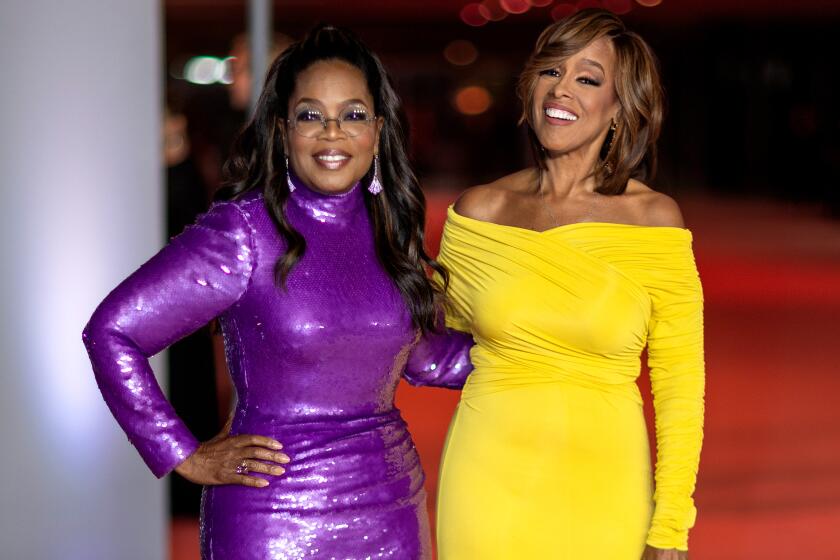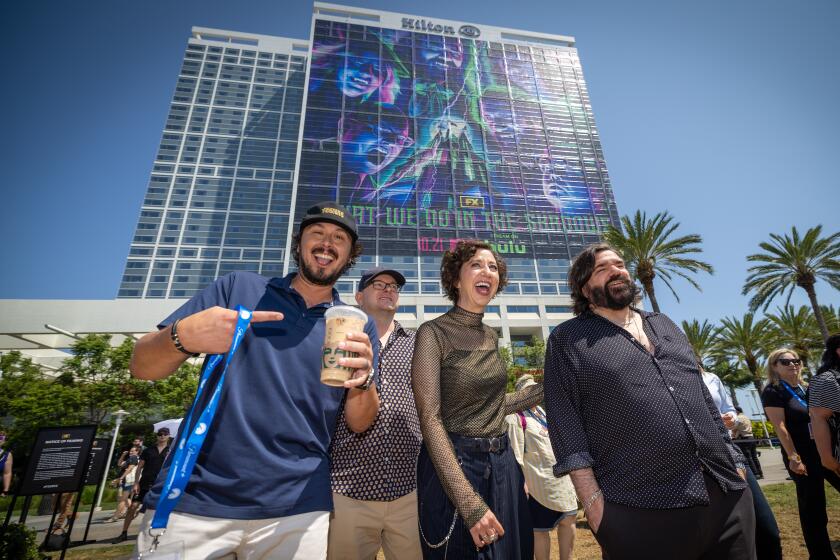A SM*A*S*H
It’s time to return to the Swamp and visit Hawkeye, Radar, B.J., Trapper, Hot Lips, Klinger and the rest of the gang of the 4077th.
CBS concludes its “Classic Weekend II” Monday with “Memories of MASH,” a retrospective of one of the most beloved and successful television series.
Based on the book by Richard Hooker and the Oscar-nominated 1970 Robert Altman movie, “MASH,” which aired on CBS from 1972 to ‘83, focused on the lives of the crew of the 4077th Mobile Army Surgical Hospital, who turned to humor as a release during the horrors of the Korean War.
Despite a shaky first season, “MASH,” ranked among the Top 10 series for nine out of its 11 seasons. The two-hour finale, which aired Feb. 28, 1983, remains the highest-rated program in the history of television.
Though “MASH” concluded its network run nearly a decade ago, it is living a happy, successful life in syndication.
“We are sort of the “I Love Lucy” of the modern era,” said Jamie Farr, who played the wacky dresser Klinger. “We’re going to be around forever.”
Shelley Long, who guested on a 1979 episode entitled “Battle Fatigue,” hosts the 90-minute special, which looks at the creation, development and impact of “MASH,” and combines episodic footage, outtakes, news clips and interviews with cast members Alan Alda (Hawkeye Pierce), Gary Burghoff (Cpl. Radar O’Reilly), William Christopher (Father Mulcahy); Jamie Farr (Klinger); Mike Farrell (Capt. B.J. Hunnicut); Larry Linville (Maj. Frank Burns); Harry Morgan (Col. Sherman T. Potter); Wayne Rogers (Trapper John); McLean Stevenson (Lt. Col. Henry Blake); David Ogden Stiers (Maj. Charles Winchester); Loretta Swit (Maj. Margaret “Hot Lips” Houlihan) and producers Burt Metcalfe, Gene Reynolds and Larry Gelbart, who also created the series.
Several cast members as well as Gelbart and Reynolds talked to TV Times about their personal memories of “MASH.” Alda, in a London production of “Our Town,” was unavailable for comment but told Calendar in an earlier interview from London: “If I hadn’t been in ‘MASH,’ you and I wouldn’t be talking in an off-Broadway theater right now, maybe.”
Early struggles
Larry Gelbart: We were in an ungodly time slot (Sundays at 8 p.m.). We were opposite “Disney” and “The FBI.” They were both respected, quasi-religious shows and here we were trying to be somewhat irreverent. But legend has it that the late (CBS head) Bill Paley’s late wife (Babe) was a tremendous fan of the show right from the beginning. I think it was due to probably some pillow talks that we were able to come back the second year. Now they cancel you by the first commercial.
McLean Stevenson: What a lot of people don’t recall is that during the first 13 weeks we were not a big hit. In fact, we were almost canceled. We followed a show called “Anna and the King” (with Yul Brynner). It was not my all-time favorite show. It rated just above “Hello, Larry” because of the costumes.
Battles With the Censors
Gelbart: There was only one show ever where they said, “You can’t do that at all”--and that was because of sexual connotations rather than political or social. Having been liberal enough to let us go ahead and do the series, it did not mean CBS was permissive week in and week out about what we could say and not say. It was sometimes a line-by-line battle. But the show is still on and all of those guys (the CBS executives) are gone.
Gene Reynolds: We had conversations on every episode. We had a very early episode that was rejected by program practices in which Hawkeye was carrying on an affair with two different nurses. The girls found out about it and they really wanted to punish him, so they both pretended to be pregnant. You could do that today, but at that time they said, “This implies he is having a dalliance with the women.” But what was going on with Frank and Hot Lips? They were not just necking in that tent.
Larry Linville: Lord, they treated us badly. We were on Sunday nights and I think there was a three-page (list of) “shall nots” for Sunday night. I think we were on three years before (Frank and Hot Lips) could grab each other and sink out of frame.
“MASH” Notes
Mike Farrell: I am a total sap about the show. I loved every minute of it. I am fully aware of the cost in terms of my career. I have done fine, but I am aware of problems with identification with a series, but the series became a phenomenon. I am proud of it and I have no complaints.
Loretta Swit: I have good memories. We all do. It is not anything that is in our lives right now and hasn’t been for a while. It’s very current with everyone else; it has been in syndication for years. It’s very much in the present for other people. I think all of us are always stunned when people want to talk about it.
Gary Burghoff: I considered it to be a great privilege. I was very fortunate to have had a television experience of that quality because, like most actors starting out, I didn’t want to be a TV actor. So when I was asked to do the TV series (he also played Radar in the movie) I made the decision based on the concept that ‘MASH” would be a sophisticated comedy, which the American public was ready for after “I Dream of Jeannie” and “The Beverly Hillbillies.”
Linville: Everybody who gets involved in something like “MASH,” which is legendary, has to sit back and realize that it might be the highlight of their professional life. If it is, what the hell, I will accept it.
David Ogden Stiers: I would hate to think, and this sounds very judgmental, that (“MASH”) is the best I was ever going to be. I am not going to know and I am never going to know that unless I keep trying to do other things.
Wayne Rogers: It was wonderful, but I don’t think it was special when we were doing it. We were doing a job just like everybody else. I didn’t go into this business to be a movie star and make money. I went in for the work itself. Alan and I used to work very hard to make an ordinary joke as good as we could. We would actually go back over things that had been on the air and think of ways to make it better and go and rehearse it. It would sound insane, but it has to do with the dedication to the craft.
Character traits
Swit: I think all the characters changed. You can’t be on the air for that long and stay the same. We may have stopped calling her (Hot Lips) a few years before the end of the show, but she is still Hot Lips to the world. It is just the nickname. It captured everyone’s imagination and funny bone. Even though I think after the first couple of seasons, we knew what directions we wanted to take her--the writers, producers and me--it was still her nickname.
Jamie Farr: I did so many wonderful bizarre things. It had to have been an absolute dream to write for my character.
Rogers: The characters were likable. The people had some visceral attachment to those characters.
Reynolds: We didn’t want to make Hawkeye a billy goat. We didn’t think that was too cute having him grabbing and nailing every nurse. We found it a little degenerate and it didn’t make the kind of point we wanted to make. We had in this Hawkeye character this wonderful guy who was very articulate and very indignant about the war and a bit of a clown and a maniac.
Stevenson: I played my dad. My father was a country doctor and he was 80 years old when he passed away. I don’t think my dad every charged more than $1 for a house call and he couldn’t balance his checkbook. He was probably the world’s worst businessman.
Fans
Linville: I was doing a play in Canada and this woman and her (7-year-old) daughter came up and said, “‘Are you in ‘MASH’?’ What did you do?” I said I was the one who was chasing the blonde all the time. The girl said, “God, you look old.” I said, “You’ve got to realize we did those 18 years ago.” She said, “Eighteen? Eighteen is really old.” I guess it’s your perspective. Every night when that thing goes on the air I am 32 again.
Stiers: I was standing in Golden Gate Park on the set of (an upcoming) HBO movie, “Ishi,” a few weeks ago and this guy with a Kodak turned around and said, “I know you. I saw you in a great thing in San Diego (at the Old Globe Theatre), “Billy Bishop Goes to War.” I thought you were really great.” I said, “THANK YOU.” It is great when they remember when you do other things. It certainly lessens the sting when they bring up the four letter word, the “M” word--the green show.
The Big Mistake
Stevenson: I left “MASH” because of money. NBC offered me more money. CBS came along and tripled my salary to stay. Everytime CBS gave me an offer, NBC would double it. But when I left the show, the mistake was not in leaving, the mistake was that I thought everybody in America loved McLean Stevenson. That was not the case. Everybody loved Henry Blake, so if you go and do the “McLean Stevenson Show,” nobody cares about McLean Stevenson.
The Write Stuff
Stevenson: The star of “MASH” was the writing. The writers were the stars. They wrote for the characters and understood what they were all about. That is why for the most part each of us used our own hometowns; we would relate stories we had, our feelings about things. Those things were expressed in the writing.
Rogers: You have to attribute the success of the show to the writing and not “our acting.”
Favorite Episode
Linville: The one I appreciated most was, “Sometimes You Hear the Bullet.” That was the one where Hawkeye’s dear friend shows up and he’s crazier than Hawkeye. They stay up all night and he goes off in the morning and (Hawkeye and the doctors) hit the O.R. His friend comes in and is all shot to pieces and is put on the table and Hawkeye tries to save him. The man dies. Stanislavski, the great Russian teacher and director, once defined the pinnacle of theatrical art to be what he called the “grotesque,” which is a combination of comedy, drama and terror. And in that episode we nailed all three of them and we did it in 24 minutes and 10 seconds between the titles. To me that show is a miracle.
Swit: Probably our finest hour was our retrospective. It was the first time any situation comedy had been able to do that. Our finest hour was made up of films clips of past shows dealing with each character, showing moments of that character. I used to think that was a classic show.
Rogers: I got to be honest with you, I don’t remember (a favorite episode). I have very little memory of specific pieces. It has a kind of blend.
Reynolds: I like “The Interview Show” (with Clete Roberts). (Gelbart) said, “Do you remember when we were first doing our research for the show early on? We looked at a bunch of stuff about Korea and one of the first things we looked at was an episode of Ed Murrow’s “See It Now.” That is a show for us, some guy in Korea interviewing all of our people.”
Farrell: The show that defined “MASH” was the original interview episode with Clete Roberts. That was a way to look into these peoples’ lives and investigate their situation, their feelings being away from home on an intimate level.
Would The Networks Air “MASH” Today?
Farrell: I don’t think there is a chance “MASH” would get on the air if it would start today. There doesn’t seem to be the willingness to commit to the quality of the project.
Farr: I honestly couldn’t tell you, when you see the shows that are really in the Top 10. I enjoy “Murphy Brown,” but I am shocked that people really like “Married ... With Children.” These shows are toilet humor and none of them have good characters. The jokes (on “MASH”) weren’t uproariously funny if you would have plucked them out of the script. But because it belonged to the character, it was extremely funny.
After “MASH”
Burghoff: “I am offered work all the time but not for TV series.” He is a commercial spokesman for British Petroleum and has co-written a screenplay for “The Presence,” a film he hopes to direct. He invented a fish-attracting device called Chum Magic.
Farr: Appears in theater in the United States and Canada. “I would love to do another TV series but nobody’s made the offer. I am surprised at CBS. We did so much for the network. I am surprised they haven’t come up with something for some of us.”
Farrell: He continues acting and has produced such films as “Dominick & Eugene” and the recent Lifetime thriller “Silent Motive.”
Linville: Appeared on Broadway last year in Neil Simon’s “Rumors” and frequently does theater in Canada.
Rogers: Owns the popular Hollywood restaurant, Columbia Bar & Grill, and has co-produced such award-winning TV films as “Age-Old Friends” and “Perfect Witness.” “I just turned down something (to act in). I went into this (business) for a reason and so I try to be selective about what I do. But I am aware they are going to call Bob Redford or Dustin before they call me.”
Stevenson: Appears in plays and guest shots on TV. A burn victim at age 6, he is actively involved in the Children’s Burn Foundation in Sherman Oaks.
Stiers: Recently appeared in “Doc Hollywood” and is the voice of Cogsworth the clock in the new Disney animated feature “Beauty and the Beast.” He also is an accomplished conductor and will be conducting the Los Angeles Mozart Orchestra on Dec. 7 at Forest Lawn.
Swit: Has been touring the United States and Canada in the one-woman play “Shirley Valentine” for the past nine months and recently finished hosting a 26-part series for the Discovery Channel, “Those Incredible Animals.”
Gelbart: He won the best book Tony Award in 1990 for the musical “City of Angels.” His newest play, “Power Failure,” premiered earlier this year at the American Repertory Theatre at Harvard.
Reynolds: Has several made-for-TV movies in pre-production.
“Memories of MASH” airs Monday at 9:30 p.m. on CBS.
Reruns of “MASH” air Mondays-Saturdays at 11:30 p.m. on KTTV; Sundays at 5 p.m. on KFMB ; and Sundays at 4 a.m., Mondays at 10 p.m. and Saturdays at 2 a.m. on KESQ.
The complete guide to home viewing
Get Screen Gab for everything about the TV shows and streaming movies everyone’s talking about.
You may occasionally receive promotional content from the Los Angeles Times.




